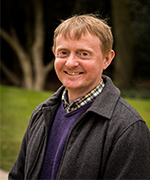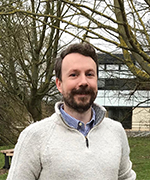Enterprise fellowships awarded
Posted on 25 March 2019
The University's 2019 Enterprise Fellowships have been awarded to Dr Yvette Hancock (Physics), Dr James Stockdale (Environment and Geography), Dr James Comerford (Chemistry) and Dr Tom Hartley (Psychology).
The York Enterprise Fellowships enable talented researchers to spend a year, fully funded, developing their research in close collaboration with organisations interested in the translational, and potentially commercial, application of their ideas.
Dr Yvette Hancock
The Fellows and their teams receive one-to-one expert mentoring and around £15,000 to support and progress their ideas. Fellows take part in a series of courses on business and finance, customer engagement, users and branding and leadership. These courses will also be open to the wider research community at York.
During her fellowship year, Yvette Hancock aims to develop a spectroscopy instrument for the rapid fingerprinting and diagnosis of a range of health conditions including cancer. This type of spectroscopy testing of tissue samples is quicker and more cost effective than lab-based tests. It also provides a more discerning assessment of disease for early and targeted intervention and reduces patient morbidity/mortality and anxiety. The Fellowship held by Yvette Hancock is supported by the University’s Centre for Future Health.
Dr James Stockdale
In order to meet the global targets for the reduction of greenhouse gases (GHGs), there is growing requirement for clear and available information so the production of food, bioenergy crops, and the management of natural landscapes around the world can be done in a sustainable way.
James Stockdale will continue to improve and grow SkyLine2D technology, designed to take data from the field to the world. This technology could be used for research and monitoring in a range of agricultural and natural applications, including crop and soil response in field trials and climate manipulations. It could also be used to monitor GHG emissions from carbon rich peatlands.
Dr Tom Hartley
Tom Hartley plans to develop The Four Mountains Test (4MT), a tool developed for non-commercial research, into an application that can be used commercially around the world, for example in the testing of new drugs.
The seven minute, tablet-based psychological test specifically targets brain functions affected in the earliest stages of Alzheimer’s Disease (AD). Using computer-generated landscapes to test patients’ ability to recognize places, the 4MT is currently being used in proof-of-concept clinical trials across Europe.
Dr James Comerford
Plastic pollution has rapidly become a huge global issue. James Comerford will be developing Addible, a unique research service to support plastic recycling. Residual additives in plastics such as dyes, pigments, flame retardants, and contamination in plastic waste cause serious complications in the recycling process, dramatically limiting the quality and application of the subsequent end products.
Addible will use computer modelling to identify sustainable formulations able to extract problem additives from plastics so they can be recycled. James Comerford’s fellowship has been supported through philanthropic donation by alumni Bryan and Lydia Gray.
Professor Jon Timmis, Pro-Vice-Chancellor for Partnerships and Knowledge Exchange said:
“The 2019 Fellows fought off stiff competition and between them are developing some potentially life changing ideas and products that can benefit societal health, wellbeing, the environment and economy. We are proud to be able to support them and their work in this way.”
Find out more about the Enterprise Fellowships.
Find out more about support and training for Fellows.




